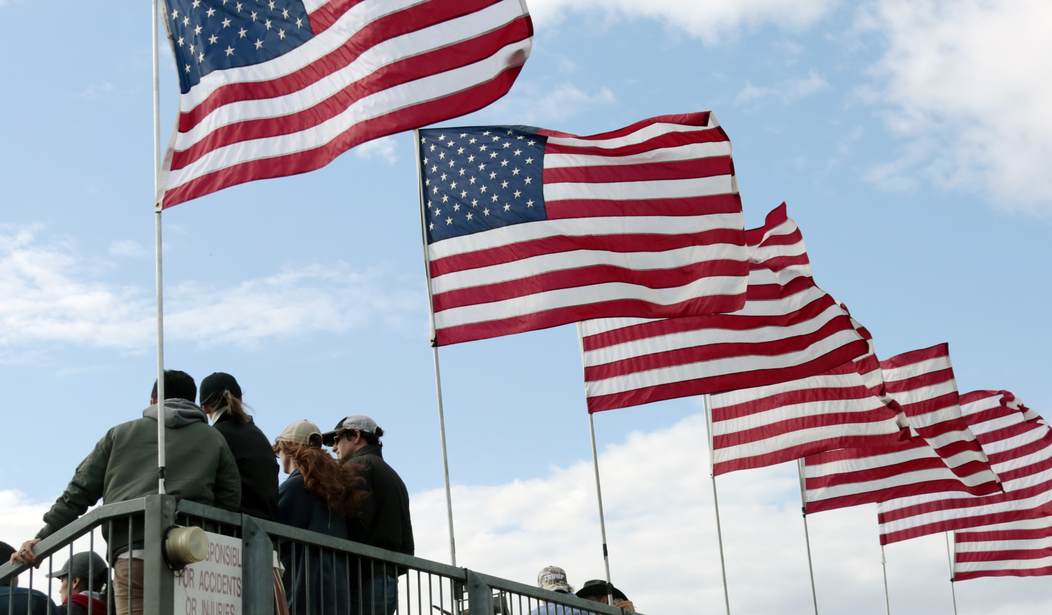Things have been pretty bleak and heartbreaking of late, so here’s some good news.
“Top Gun: Maverick” has been lighting up movie screens and — based on my own personal social media observations — is routinely inspiring clapping and cheering from American audiences. And that’s not even the best part. The second installment of the 1986 Tom Crusie classic is achieving its success without the help of a formerly very vocal Chinese investor, internet and tech giant Tencent.
Remember the flight jacket, scrubbed in the 2019 trailer of certain flags to appease Chinese censors? My how things have changed.
To the joy of Taiwanese audiences hitting the theaters this week, Top Gun: Maverick features a prominent shot of the Japanese and Taiwanese flags—national symbols that were scrubbed from a 2019 trailer.
The flags were initially replaced by random symbols, drawing sharp criticism as an example of Hollywood caving in to China’s political demands. But in a rare U-turn, which has yet to be explained, they have reappeared in the film’s worldwide release.
“It is unprecedented,” Ho Siu Bun, a film critic in Hong Kong, told VICE World News. “Major film studios have never been shy about pandering to the Chinese market. And even if it is a simple scene, editing is very costly. So no one knows why they changed it back.”
According to The Wall Street Journal, Tencent’s involvment — an agreement the company boasted about during production — “once symbolized deepening ties between China and Hollywood.” The gaming company’s about-face on a movie that’s drawn many domestic movie buffs back to the theater is now seen as “a fresh example of the broader tensions forming between the U.S. and China.”
One of the largest tech companies in the world, Tencent operates the popular WeChat messaging app, a videogame business and a streaming-entertainment platform. It has been one of several Chinese firms moving most aggressively into Hollywood, investing in big-budget releases like “Terminator: Genisys” and smaller titles like the Mr. Rogers biopic “A Beautiful Day in the Neighborhood.”
Tencent initially put up millions of dollars for a 12.5% stake in the film before dropping out, according to people familiar with the financing.
In late 2019, when Tencent quietly backed away from the film, companies operating in China were under pressure to pledge loyalty to the Communist Party as part of President Xi Jinping’s tightening grip on his country’s businesses. At a July 2019 ceremony announcing its co-financing of “Top Gun: Maverick,” Tencent also trumpeted a coming lineup of propagandistic domestic films extolling the history and heroism of the Chinese Communist Party.
What makes this break between the two nations over a Hollywood film particularly interesting is that Tencent is a gaming company, not an entertainment giant, But the company has been pronounced in its desire to dip its fingers in a whole lot of other pies — and has more than its fair share of concerning scandals related to the theft of intellectual property and surreptitious user data collection.
One of the most surprising things to learn about Tencent is how many of your favorite games, developers, and technology companies are at least partially owned by the Chinese tech giant. Tencent has invested in around 150 companies outside of China. These aren’t insignificant companies, either. Some of the highest-profile names on the list include Tesla, Reddit, and Spotify.
In the gaming world, Tencent has an even larger footprint. The company is a significant investor in Activision Blizzard, Epic Games, Riot Games, and Bluehole. These investments give Tencent a piece of some of the world’s biggest games, such as World of Warcraft, Fortnite, League of Legends, and PlayerUnkown’s Battlegrounds.
…
Both Riot Games and Epic Games received letters from the United States Committee on Foreign Investments that requested details on their security protocols for customers’ personal data. These actions are a part of US government initiatives under the Trump administration to better understand how Chinese companies utilize data collected by software sold to Americans.
While these investigations into Tencent’s gaming investments were unsettling, they stopped short of the more dramatic actions the US government took against other Tencent holdings. The Trump administration banned the popular messaging app WeChat, owned by Tencent, in September 2020, alongside Bytedance’s popular social platform TikTok. According to a letter from the White House, WeChat and TikTok had collected so much data from American citizens that it could allow companies to “conduct corporate espionage.”
The Wall Street Journal reports that Tencent’s decision to walk away from a film that’s looking like it will break $150 million at the box office Memorial Day weekend isn’t some great mystery. It’s simply run-of-the-mill Communist party politics.
The reason: Tencent executives backed out of the $170 million Paramount Pictures production after they grew concerned that Communist Party officials in Beijing would be angry about the company’s affiliation with a movie celebrating the American military, according to people familiar with the matter.
American audiences have more reasons to cheer for “Top Gun: Maverick” this weekend than they may even realize.












Join the conversation as a VIP Member